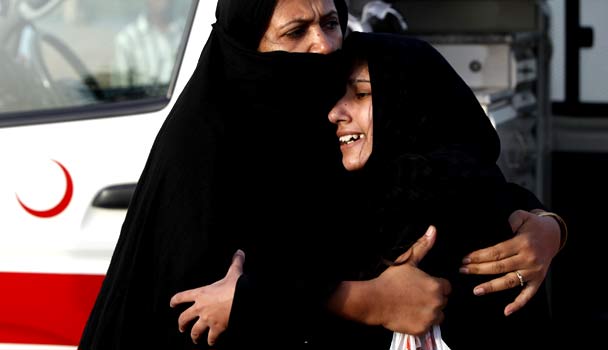 |
| Women mourn after the Lahore Ahmadiyya massacre in May 2010 |
Source/Credit: New Europe
By Fiorello Provera | November 15, 2010
Earlier this year the European Parliament passed a resolution highlighting the persecution of religious minorities in Pakistan. For the European Union, and in particular for MEPs, the right to freedom of worship is fundamental, universal and non-negotiable. In Pakistan, however, the free practice of religion - at least for non-Muslims - is difficult, hazardous and rare.
Part of the problem of religious persecution in Pakistan stems from the establishment of the country itself in 1947 and the promulgation of its constitution in 1956. It is officially called the Islamic Republic of Pakistan, which, in effect, makes the state indivisible from Islam. Pakistan placed religion at the heart of its raison d'être in order to distinguish itself from its rival India, from which it had been separated.
But whereas India has developed into a sophisticated democracy in which people of all religions and none live side by side in relative harmony, Pakistan has gone the opposite way. Indeed, Pakistan's attitude to religious freedom stems also from its attitude to political freedom.
Democracy - at least as we in the EU understand it - remains elusive in Pakistan. For much of its history Pakistan has been ruled by military dictators, and even during periods of civilian government the army has maintained ultimate power, as regular coups d'état have shown.
Moreover, the military has cynically used Islamisation as a means of controlling the population.
This process gathered pace under General Zia ul-Haq, who imposed draconian and disproportionately harsh laws during the 1970s and 1980s in order to enshrine the dominance of Islam.
The Hudood Ordinance was a law passed in 1979 that replaced civil sentences for various crimes with sharia punishments as mandated by the Koran. One of its consequences was to make it extremely difficult and dangerous for women to prove an allegation of rape. Pakistan's own National Commission on the Status of Women estimated in 2003 that eighty per cent of women in prison had been incarcerated for adultery because they had failed to prove an allegation of rape.
This part of the Hudood Ordinance was repealed in 2006 by a law that made rape a crime prosecutable under civil law. However, the new law has proved extremely difficult to enforce in a country with such a weak government and conservative society. Islamist groups, which maintain a powerful grip over Pakistani society, have demanded the reintroduction of the Hudood Ordinance calling it God's divine punishment and a victim of unjust propaganda by human rights organisations.
General Zia also introduced a series of laws against blasphemy, under which anyone convicted can be sentenced to death.
The extremely wide definition of blasphemy makes it easy for the Sunni-dominated government to prosecute Christians, Hindus and Baha'i adherents, as well as Shias and Ahmadi Muslims. Ahmadis are considered to be apostates in Pakistan and are therefore subject to a particularly robust campaign of government-sanctioned vilification.
The civilian and military governments that have come after General Zia have done little to combat the rise of fundamentalism and obscurantism.
What are the solutions to the problem of religious persecution in Pakistan? The development of genuine democracy would contribute substantially to a less repressive religious environment, because religious freedom is a by-product of political freedom.
Wholesale reform of the education system would promote values of tolerance, diversity and respect.
A focus on enhancing the rights of women would undoubtedly help to dilute some of the more extremist elements of Islam in Pakistan.
A serious effort to counteract the terrorists and militants operating freely on Pakistani soil and spreading their poisonous jihadi ideology is long overdue and most welcome. Steps to improve the quality and integrity of governance and in particular to clamp down on the rampant corruption that has crippled Pakistan's economy are absolutely essential.
Ultimately, the European Parliament can criticise, expose and denounce as much as it likes, but it will never change the situation in Pakistan.
Change must come from within Pakistan, and from within Islam. Only then will Pakistan develop a progressive and open society that truly values religious freedom for everyone.
Fiorello Provera is a member of the European Parliament from Italy, a member of the Europe of freedom and democracy Group, and Vice-chairman of the Foreign Affairs Committee
Read original post here:Pakistan: persecution in the name of Islam












May Allah bless Pakistan, Iran, and Egypt with freedom of religion. Away with outdated legal codes which forbid women equal testimony in law courts with men. Hooray for religions like Baha'i and Ahmadi which propose that the law of Islam requires updating to meet the needs and requirements of the modern age.
ReplyDelete